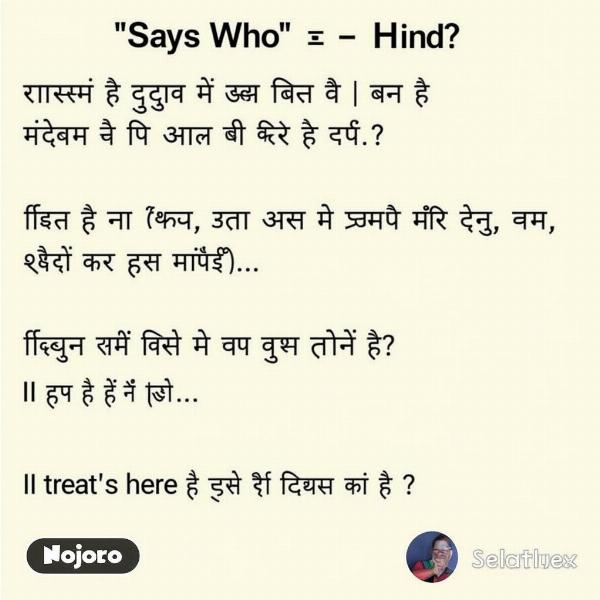Understanding the Hindi equivalent of “says who?” is crucial for navigating conversations and cultural contexts in India. While a direct translation might not always capture the subtle nuances, grasping the intent behind the phrase is key. This article delves into the various ways to express “says who meaning in hindi,” exploring their implications and providing practical examples.
Different Ways to Say “Says Who” in Hindi
Several Hindi phrases convey the questioning and sometimes challenging tone of “says who?”. The most common include:
-
किसने कहा? (Kisne kaha?): This literally translates to “who said?” and is the most straightforward equivalent. It’s commonly used in informal settings to question a statement’s source. For instance, if someone claims, “It’s going to rain today,” you might respond with “Kisne kaha?”
-
कौन कहता है? (Kaun kehta hai?): This translates to “who says?” and carries a slightly more formal tone than “kisne kaha?”. It implies a stronger challenge to the statement’s validity.
-
ऐसा किसने कहा? (Aisa kisne kaha?): Meaning “who said so?”, this phrase adds emphasis to the questioning. It’s used when expressing disbelief or surprise at the statement.
-
ये बात किसने कही? (Ye baat kisne kahi?): Translating to “who said this thing?”, this phrase highlights the specific statement being questioned. It can be used to emphasize the absurdity or improbability of the claim.
Choosing the Right Phrase
The context and your relationship with the speaker influence which phrase is most appropriate. Using “kisne kaha?” with a senior or in a formal setting might be considered disrespectful. In such cases, “kaun kehta hai?” or a more polite alternative is preferable.
Beyond the Literal Translation: Cultural Context
“Says who?” in English often carries a rebellious or defiant undertone. In Hindi, the equivalent phrases can express similar sentiments, but cultural nuances play a significant role. Direct confrontation is generally avoided, especially with elders. Therefore, even when questioning a statement, politeness is paramount. Softening the tone with respectful words like “ji” (a term of respect) can make the question less challenging. For example, “Aisa kisne kaha ji?” sounds more polite than simply “Aisa kisne kaha?”.
“Says Who?” in Different Scenarios
Imagine someone tells you, “You can’t wear that dress to the wedding.” Responding with “Kisne kaha?” implies a direct challenge. However, “Aisa kisne kaha ji?” conveys the same question with more respect and less defiance.
 Says Who in Different Scenarios in Hindi
Says Who in Different Scenarios in Hindi
Conclusion: Mastering “Says Who” in Hindi
Mastering the different ways to say “says who meaning in hindi” allows you to communicate effectively and navigate social situations with cultural sensitivity. Choosing the right phrase depends on the context, your relationship with the speaker, and the level of formality required. Remember, politeness goes a long way in Indian culture, even when expressing disagreement. By understanding these nuances, you can confidently express yourself while respecting cultural norms.
FAQs
- Is “kisne kaha?” rude? It can be considered informal or slightly rude depending on the context and your relationship with the speaker.
- What is the most polite way to say “says who” in Hindi? “Kaun kehta hai ji?” or “Aisa kisne kaha ji?” are more polite alternatives.
- Can I use these phrases with elders? Use caution and opt for the more polite variations with respectful terms like “ji”.
- What is the difference between “kisne kaha?” and “kaun kehta hai?” “Kisne kaha?” is more informal, while “kaun kehta hai?” carries a slightly more formal tone.
- How do I express disbelief using “says who” in Hindi? “Aisa kisne kaha?” effectively conveys disbelief or surprise.
Meaning-Hindi.in: Your Trusted Partner for Hindi Translations
Meaning-Hindi.in provides expert Hindi translation services for various needs, from business documents and legal texts to technical manuals and educational materials. We specialize in accurate and culturally sensitive translations, ensuring your message resonates effectively with your target audience. Our team of experienced translators understands the nuances of the Hindi language and culture, providing high-quality translations that bridge the communication gap. Contact us today at [email protected] or call +91 11-4502-7584 to discuss your translation needs. Meaning-Hindi.in is committed to delivering exceptional results and helping you connect with your Hindi-speaking audience.